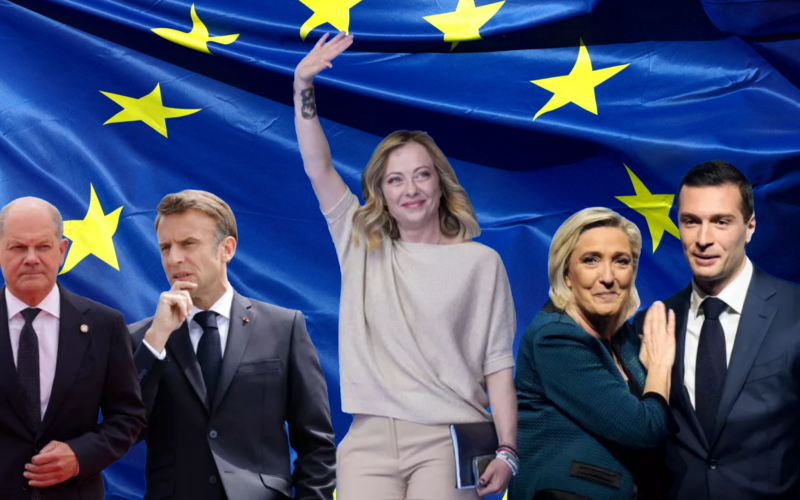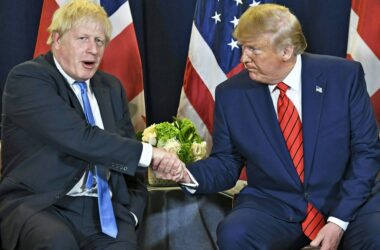The recent European Parliament elections, while preserving the majority of the mainstream pro-EU alliance, have led to notable gains for far-right parties, particularly impacting the political landscapes in France and Germany.
As polls anticipated, the mainstream pro-EU alliance—comprising the center-right, center-left, liberal, and Green parties—maintained its majority in the European Parliament, although with reduced numbers. These results show that despite significant challenges, the center held firm. The alliance secured a comfortable majority in the 720-seat parliament, underscoring the resilience of established pro-European political forces.
Conversely, national conservative and far-right groups achieved their highest-ever representation, securing just under a quarter of the seats. Their performance varied across the EU, with significant victories in some countries and weaker-than-expected outcomes in others.
Key Developments:
France:
Marine Le Pen’s National Rally (RN) dealt a significant blow to President Emmanuel Macron, winning 32% of the vote against Macron’s 15%. This result prompted Macron to take the considerable risk of calling for a snap legislative election. The outcome raises the possibility of a far-right majority in the French Parliament, potentially shifting France’s political direction.
Germany:
In Germany, the Alternative für Deutschland (AfD) gained a higher percentage of the vote (16%) than any of the parties in Chancellor Olaf Scholz’s coalition. Despite recent controversies, the AfD’s strong performance further destabilizes Scholz’s government, complicating coalition dynamics and governance.
Italy and Austria:
The Brothers of Italy, led by Prime Minister Giorgia Meloni, performed well with 28% of the vote. Austria’s Freedom Party (FPÖ) secured 26%, fulfilling expectations of a strong showing.
Mixed Results Elsewhere:
Elsewhere in Europe, far-right parties had a less impressive performance. Belgium’s Vlaams Belang received less than 14%, and the Danish People’s Party garnered 6.4%. The far-right also underperformed in Finland (7.6%) and Sweden (13%).
In Poland, Law & Justice (PiS) narrowly lost to Donald Tusk’s Civic Coalition, while Spain’s Vox did not clear 10%. The Netherlands saw Geert Wilders’ Freedom Party (PVV) lose seats to the Labour/Green Left Alliance. Hungary’s Prime Minister Viktor Orbán faced a challenging night, marking one of his worst performances in recent years.
National Impact and Parliamentary Dynamics:
These election outcomes reflect national political climates more than a uniform shift at the EU level. Cas Mudde, a populism expert at the University of Georgia, pointed out that far-right parties are still underrepresented in the European Parliament compared to their national strength. Mujtaba Rahman of the Eurasia Group noted that while the far-right made gains, their internal divisions and lack of organization would likely limit their impact on the EU’s legislative agenda.
The European Parliament’s current makeup, with the pro-EU mainstream center securing about 455 seats, still provides a stable majority. The center-right European People’s Party (EPP) and the center-left Socialists and Democrats (S&D), along with the liberals of Renew and the Greens, collectively ensure this majority. The far-right factions, including the national-conservative European Conservatives and Reformists (ECR), the far-right Identity and Democracy (ID), and non-aligned parties like AfD and Orbán’s Fidesz, together hold around 145 seats.
The elections’ main effects will likely be seen in national capitals, particularly Paris and Berlin, where the rise of far-right parties challenges established political orders and holds potential to reshape national policies. Nicolai von Ondarza from the German Institute for International Affairs (SWP) indicated that European politics might become more polarized and populist, with right-wing parties seeking to influence debates on migration and climate legislation, the topics being most sensitive in resent years.
Immigration Policies
Lawmakers from far-right parties are advocating for more restrictive migration policies. They argue that certain countries, notably Greece and Italy—each with influential far-right factions—are disproportionately burdened with accepting migrants, while other European nations fail to contribute equitably. Many of these lawmakers hold anti-immigrant sentiments, driven by the belief that European identity—particularly white, Christian European identity—and various national identities are endangered by the influx of migrants, especially those from regions like the Middle East and Africa.
Green Agenda and Climate Policies
The EU’s Green Deal, a flagship initiative aimed at achieving carbon neutrality, faces increased opposition from right-wing factions. The Parliament has already seen climate legislation diluted to accommodate right-wing views. Analysts predict that agricultural policies will avoid further restrictions and that the proposed ban on internal combustion engine vehicles by 2035 could be challenged. Citi analysts suggest that the bloc might shift focus toward securing cheaper energy sources, including potential support for nuclear power and gas fracking.
Support for Ukraine and European Defense
Support for Ukraine, amidst the ongoing conflict with Russia, is a topic of debate, with some EU member taking a pro-Russian stance. Dutch ECR member Dorien Rookmaker expects continued support for peace in Europe, but discussions around European defense spending and a shared defense budget will be prominent. Analysts from Citi highlight that far-right and far-left parties may resist increased defense spending but could support a more European-focused defense structure.
Industrial Strategy and Trade
The EU’s industrial strategy might evolve, balancing its relationship with the U.S. and China. The bloc is likely to continue investing in high-tech and green industries, following recent initiatives like the European Chips Act and the Critical Raw Materials Act. There could also be a tougher stance on Chinese imports, aligning with a trend towards greater protectionism and strategic intervention.
EU Enlargement
EU enlargement prospects may face setbacks due to increased euroskeptic presence in Parliament. Analysts Bikarski and Balt predict that political will and domestic nationalist politics could hinder the acceptance of new members, suggesting the EU will remain a 27-member bloc through 2029.
Challenges in Coordinating the Right
Despite their gains, right-wing factions may face challenges in forming a cohesive group to influence key legislation. The ECR aims to reduce the influence of EU institutions and alter climate policies, while the ID advocates for stricter immigration control and skepticism toward EU governance. Berenberg Economics notes that internal disagreements could limit their impact on policy. Chatham House’s Armida van Rij adds that the far-right’s organizational capabilities will determine their ability to assert influence effectively.
Overall, while the far-right’s increased presence may shape specific policy areas, the extent of their impact will depend on their ability to unify and navigate the complexities of the European Parliament’s legislative processes. The fundamental balance of power in the European Parliament remains unchanged, with the pro-European center maintaining control. However, the political dynamics in national capitals, particularly France and Germany, will be crucial in shaping the future direction of the EU and its member states.








